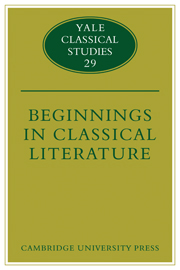Book contents
- Frontmatter
- Contents
- Introduction: beginning at Colonus
- How Greek poems begin
- The Muse corrects: the opening of the Odyssey
- Sappho 16, Gorgias' Helen, and the preface to Herodotus' Histories
- Tragic beginnings: narration, voice, and authority in the prologues of Greek drama
- Plato's first words
- Plautine negotiations: the Poenulus prologue unpacked
- Proems in the middle
- Openings in Horace's Satires and Odes: poet, patron, and audience
- An aristocracy of virtue: Seneca on the beginnings of wisdom
- Beginnings in Plutarch's Lives
- “Initium mihi operis Servius Galba iterum T. Vinius consules …”
Openings in Horace's Satires and Odes: poet, patron, and audience
Published online by Cambridge University Press: 10 January 2011
- Frontmatter
- Contents
- Introduction: beginning at Colonus
- How Greek poems begin
- The Muse corrects: the opening of the Odyssey
- Sappho 16, Gorgias' Helen, and the preface to Herodotus' Histories
- Tragic beginnings: narration, voice, and authority in the prologues of Greek drama
- Plato's first words
- Plautine negotiations: the Poenulus prologue unpacked
- Proems in the middle
- Openings in Horace's Satires and Odes: poet, patron, and audience
- An aristocracy of virtue: Seneca on the beginnings of wisdom
- Beginnings in Plutarch's Lives
- “Initium mihi operis Servius Galba iterum T. Vinius consules …”
Summary
Maecenas is a preeminent figure in Horace's poetry. Theirs is the most famous, most documented, and most studied of all relationships between an ancient writer and his patron, and it hardly needs to be said that Maecenas' name always appears in Horace's poetry in the right and obvious places: Epodes 1.4, Satires 1.1.1, Odes 1.1.1, and Epistles 1.1.3. Formally, Horace makes it very clear that Maecenas is to be a focal point of his audience's attention. Yet, the poet's relation to his patron is in general complex (witness the recusatio), and this is true even in the ostensibly straightforward dedication at the beginning of each work.
Although at first glance the patron appears to be both the major catalyst for the poems and the sole person in whose praise these poems have been written, a more careful reading of the dedicatory poems reveals a multiplicity of audiences and voices, including but not limited to patron and poet, all of which are important for an understanding of Horace's works. My interest here will be in two specific opening poems, Satires 1.1 and Odes 1.1 (the opening poem of Odes Books 1–3, published as a collection in 23 B.C.). I will argue that one of the main functions of these poems is to establish the authorial voice of the poet by delineating the various levels of audience to be addressed, and further, that the programmatic nature of these poems lies in their shifting addresses and polyvocality, a technique that identifies the poems as peculiarly Horatian.
- Type
- Chapter
- Information
- Beginnings in Classical Literature , pp. 161 - 186Publisher: Cambridge University PressPrint publication year: 1992



